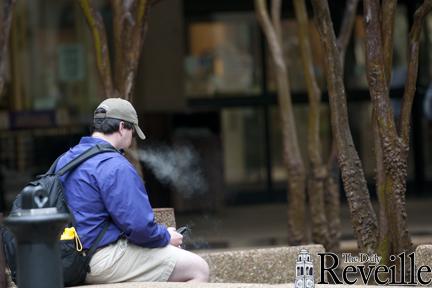More and more public places are banning or restricting tobacco use, primarily smoking, on their premises, but nicotine is highly addictive and resources to help users kick the habit are too few.
Kick Butts Day, a national day of activism against tobacco, is March 19. LSU is partaking with thousands of other activists in the country by hosting a Kick Butts Day tailgate that evening. It is important to take a stand against cigarettes, but when it comes to tobacco, the real butt to kick is addiction’s.
The limited number of rehabilitation centers and support groups for those addicted to nicotine is detrimental to creating a more healthy and smoke-free society. Simply limiting or restricting the places that one can use tobacco has benefits, like reduction of secondhand smoke, but that’s not dealing with the problem at its core. Helping those with tobacco habits should be just as important and emphasized as cutting the number of places someone can light up.
According to the National Institute of Health, an individual may notice symptoms of nicotine withdrawal within two to three hours after their last use of tobacco. For those who are quitting, symptoms will peak in two to three days without nicotine and may cause anxiety, depression, trouble sleeping or problems concentrating.
These side effects and symptoms would prove challenging to a student at a university with a smoking ban. The trials of life in academia are challenging enough on both physical and mental levels. The solution of reducing the amount of space one can smoke benefits mostly one side of a two-sided problem. It is to get tobacco smoke clear of non-users’ lungs and to clear the smoky haze of addiction that clouds many users’ minds.
The Tobacco Control Initiative in partnership with LSU Health Sciences Centers New Orleans offers treatment to patients of LSU hospitals. The goal is to implement and evaluate tobacco cessation services. The treatment program includes
self-help material, behavioral counseling for individual and groups, quit-line support, pharmacotherapy and social support. The contact information for a Baton Rouge TCI staff member is on the center’s website.
There is also an organization called Quit With Us, Louisiana, which allows former smokers to share their story of how they stopped using tobacco on the organization’s website.
The National Institute of Health notes that millions of Americans have successfully quit smoking, and the number of cigarette smokers in the U.S. has dropped in recent years, but the number of smokeless tobacco users has steadily increased.
Smokeless tobaccos are placed in the mouth or in the nasal passage and are an allowed form of tobacco use in many places where smoking is banned. Perhaps there is a link. Smokers are quitting their cigarette use and picking up smokeless tobacco products to satisfy their body’s dependence on nicotine. Therefore, the common denominator in helping all parties is recognizing and treating nicotine addiction.
As some might argue, there is no “out of sight, out of mind” philosophy when it comes to addictive substances. Whether a person is battling to end their dependency on alcohol, prescription medication or tobacco use, the power of addiction in the mind makes the process more strenuous than just quitting cold turkey.
More emphasis needs to be put on support groups and counseling in nicotine treatment centers for users who have had no success with mere patches or gum. The over-the-counter nicotine aids do help alleviate withdrawal symptoms and dwindle down a body’s need for the chemical. However, it does nothing for the habitual routine of smoking after breakfast, before lunch and during the car ride home from work.
These are mental aspects that hinder ending tobacco dependency and require empathy and testimonies from former tobacco users and guidance from a medical professional.
Nearly 43 percent of adult daily cigarette smokers stopped smoking for more than one day in 2010 because they were trying to quit, according to the Centers for Disease Control and Prevention.
Clearly, large portions of smokers genuinely want to quit, and I believe that there is strength in numbers. If people passionate about quitting tobacco use could gather together and make beating addiction a group incentive, then the number of tobacco users would decrease. However, these programs are few and are generally regarded for those with “more serious” addiction, which is not true. I have no doubt that there are individuals that would take advantage of a quitting program like this for themselves and others.
It’s the feeling of personal triumph over one’s addiction and conveying that pride to others by supporting them that will help tobacco users beat their own addiction. Advocating against tobacco usage is no good if there is no help to motivate and encourage current users to abandon their habits. More personalized and supportive programs are key to winning the battle for a healthier and happier America.
Opinon: Emphasis needs to be placed on treatment for nicotine addiction
March 18, 2014

The SmokingWords campaign to make LSU campus tobacco-free is in part attributed to smokers and cigarette butt litter in the Quad.






